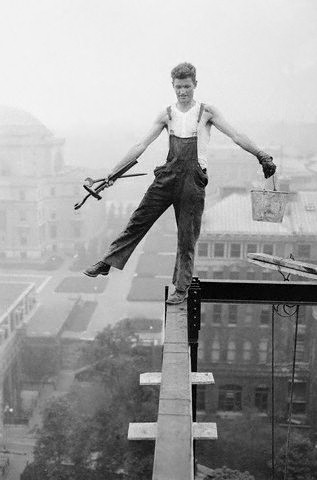Barnard does not accurately reflect the world beyond its gates. (And I'm not talking about the disproportionate population of the Long Island JAP Leggings-and-Uggs set.) The college seeks to cultivate an atmosphere that empowers women in ways that can seem heavy-handed. There are all manner of events, lectures, courses, and performances that feature feminist themes and brilliant female artists and intellectuals.
I attended events I found meaningful -- readings by
beloved professors, panels where Mary Cheney sat alongside Kathleen Turner. I saw Sandra Day O'Connor speak at Barnard before she retired. Anna Quindlen, who writes on feminism well and often, is chair of the board of trustees and, it seems, makes a point of being a visible campus presence. There is a big student-run event each spring called Sexhibition -- not the day to bring kids to play in the grass, unless they want to try the dildo ring toss -- and health services offers weekly GYN appointments.
The best example of Barnard crazy was Doris, a sweet older woman who worked in the College Activities Office. Her voicemail messages, sent campus-wide through the phone system (I can only guess her greetings continued after my freshman year; I stopped using landlines), were legendary. "Hello my strong, beautiful Barnard women," she'd intone, at least weekly, no sarcasm included. The rest of the message regarded discount theater tickets.
All this seemed like overkill at the time. I wondered why it was necessary to fling constant examples of the world at us. Of course women can be artists, writers, and scientists. We're smart and motivated. Who would stop us?
Somewhere there, I imbibed Barnard's baseline assumption that women not only can reclaim success, sexuality, and femininity and redefine them on their terms but also that they must, and do. One day, perhaps, stay-at-home-dads will not seem anomalous outside Park Slope and female bodies won't be objectified in pop culture. Until then, we fight. I realized soon after graduation that, though this all seemed dully obvious to me, it's not the prevailing M.O. out in the real world. I felt like the wind was socked out of me (a bad simile for bad novels, but true).
I interned at a science magazine in the fall. It's a good publication staffed by smart, passionate journalists. Its features kept me -- not a science aficionado -- engrossed. But the magazine's definition of "science" is a narrowly traditional one; it's science as a superstar-driven process whose results teach us more about how nature is.
I took a course at Barnard called Anthropology of Science where the professor argued convincingly that a traditional view of science discounts the ways knowledge-making is a result of the interplay between "nature" and "culture" -- that it may even be impossible to disentangle the two. Take stem cell research: rules
prohibit conducting most inquiry with equipment that was bought with federal funding. These money rules hamper the ways scientists can design and conduct experiments, which then affect their results. What we know about stem cells could look very different in a different socio-political atmosphere. Writing about science as though it is its lab results, then, obscures a large part of the picture. Science also
looks different when people other than the traditional white male lab director wield the microscope, because different backgrounds make different seeing.
I asked a female editor why the magazine did not address issues of race, gender, and politics in science more often. She said they cover the findings of labs, and most labs are run by white men. I hope women make it to the top soon, she said, so we can cover them too. Exit oxygen.
The other science magazine epiphany concerned the "magazine" half. I can best liken its female editorial director to Meryl Streep's character in
The Devil Wears Prada.
(I liked the movie but haven't read the book. I have a rule against reading books with illustrated shoes and martini glasses on their covers. And pink. No pink.) She has a long magazine career behind her, is always impeccably put together in subtly expensive clothes, has razor intelligence and correctly assumes she knows more about the business than anyone else in the room.
One might bet (and I've heard tell) that this woman clawed her way to the top of the magazine world in an era when sexism was more overt and snagging a dream career came at a cost. Now she can't see her influence as a leverage point to help young women keep steady in her toeholds. Her attitude is more "I fought to get here and you should, too." I watched her use small, human errors as fodder for permanent falls from favor. The staff is terrified of her judgment. It made me sad to see so much insight that was not being transmitted. Even Miranda Priestly was allowed to recognize the efficacy of choices she didn't make, and she's fictional.
Some successful women, a professor told me as we navigated one of Columbia's labyrinthine brick walkways last spring, in another life, want to help the women that follow them through the pipeline. Others enjoyed their status as the only gal in the room and don't want their primacy threatened by new arrivals. As a newly minted college grad, I truly believed that most women with influence sought to incinerate the glass ceiling. My naivete was showing.


